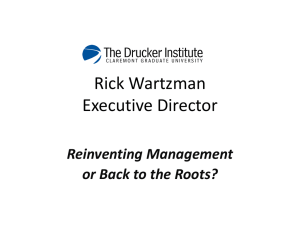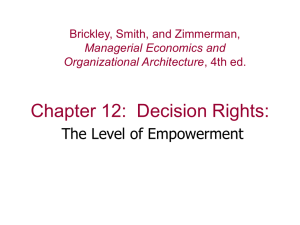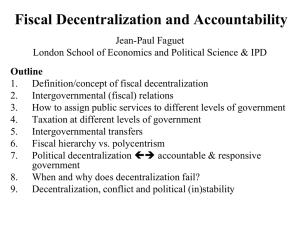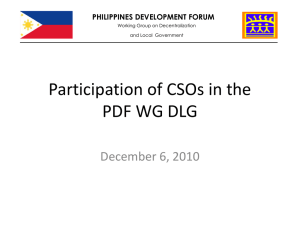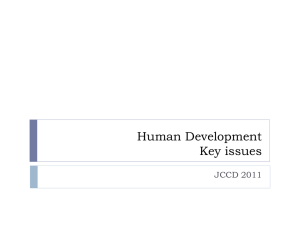UNIT 1_ INTRODUCTION
advertisement
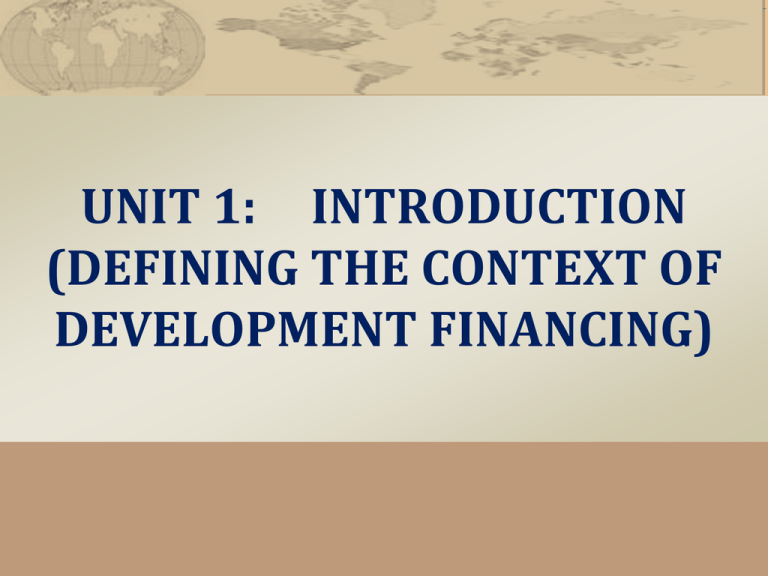
UNIT 1: INTRODUCTION (DEFINING THE CONTEXT OF DEVELOPMENT FINANCING) Decentralization, Decentralized Planning & Fiscal Decentralization What do You Understand by Decentralization? 4/13/2015 UNIT 1: INTRODUCTION 2 Decentralization, Decentralized Planning & Fiscal Decentralization What is the Purpose of Decentralization? Failure of centralized systems to deliver efficiently Decentralization has the potential to ensure a more equitable distribution of resources It is part of the good governance/democratisation agenda It is supposed to engender popular participation in decision-making 4/13/2015 UNIT 1: INTRODUCTION 3 Decentralization, Decentralized Planning & Fiscal Decentralization What are the Various Types of Decentralization? 1. Administrative Decentralisation • Transfer of public service delivery functions from central government to local governments, field offices of MDAs, etc • Two main types: – Delegation – Deconcentration 4/13/2015 UNIT 1: INTRODUCTION 4 Decentralization, Decentralized Planning & Fiscal Decentralization What are the Various Types of Decentralization? 2. Economic Decentralization (Divestment) • Transfer of economic planning, production, distribution or other economic functions from government to voluntary, private or non-governmental institutions. • Examples: ‾ Privatisation (a.k.a. Market Decentralisation) ‾ Deregulation: 4/13/2015 UNIT 1: INTRODUCTION 5 Decentralization, Decentralized Planning & Fiscal Decentralization What are the Various Types of Decentralization? 3. Political Decentralisation: Transfer of political power from central government to lower-tier authorities. Devolution is the ultimate form of political decentralization 4/13/2015 UNIT 1: INTRODUCTION 6 Decentralization, Decentralized Planning & Fiscal Decentralization 3. Political Decentralisation (cont.): Devolution: Full transfer of resource mobilization and allocation responsibilities from central government to an quasiautonomous, sub-national public authority that is fully independent of the devolving authority Usually culminates in the establishment and empowerment of local governments that is accountable to the local population. Usually involves the establishment of a legal and regulatory framework 4/13/2015 UNIT 1: INTRODUCTION 7 Decentralization, Decentralized Planning & Fiscal Decentralization What are the Various Types of Decentralization? 4. Decentralized Development Planning It is the transfer of development planning (and implementation) functions and powers from central government to local governments, communities and other sub-national entities. 4/13/2015 UNIT 1: INTRODUCTION 8 Decentralization, Decentralized Planning & Fiscal Decentralization What are the Various Types of Decentralization? 5. Fiscal Decentralisation: The restructuring of existing systems of resource mobilization and allocation with the aim of empowering local government authorities to perform their decentralized functions 4/13/2015 UNIT 1: INTRODUCTION 9 Decentralization, Decentralized Planning & Fiscal Decentralization What are the Various Types of Decentralization? 5. Fiscal Decentralisation (cont.): Fiscal Decentralisation may include: Formulas for transferring revenue to local govts; Legally empowering local govts to collect and retain some taxes, fees, etc; Legally empowering local govts to prepare their own budgets and disburse funds It is a key ingredient for successful devolution. 4/13/2015 UNIT 1: INTRODUCTION 10 Overview of Ghana’s Decentralization Policy Some Key Features: Re-demarcation of administrative jurisdictions (metropolitan areas, municipalities and districts) Establishment of Metropolitan, Municipal and District Assemblies Establishment of sub-district structures: Town/Area Councils, Unit Committees, etc 4/13/2015 UNIT 1: INTRODUCTION 11 Overview of Ghana’s Decentralization Policy Some Key Features (cont.): Restructuring of resource allocation and resource sharing b/n central and local govts E.g. District Assemblies Common Fund, land rates and minerals royalties, grants, transfers, and external credits to local governments Designating MLGRD as the agency responsible for implementation of the decentralisation policy 4/13/2015 UNIT 1: INTRODUCTION 12 Overview of Ghana’s Decentralization Policy Some Key Features (cont.): Establishment of NDPC to co-ordinate decentralised development planning Establishment of structures and mechanisms to enhance probity, accountability and transparency in public administration at all levels of government 4/13/2015 UNIT 1: INTRODUCTION 13 Overview of Ghana’s Decentralization Policy Main Components of Ghana’s Decentralization Policy Political decentralisation Administrative Decentralisation Decentralized Development Planning Fiscal decentralization 4/13/2015 UNIT 1: INTRODUCTION 14 Overview of Ghana’s Decentralization Policy Main Components of Ghana’s Decentralization Policy A. Political decentralisation Re-demarcation of the country into districts Establishment and empowerment of the RCCs, MMDAs & the Sub-District Structures to perform various functions Establishment of the MMDAs as legislative, administrative, planning, service delivery, budgeting and rating authorities Sub-district structures to facilitate resource mobilization and popular participation 4/13/2015 UNIT 1: INTRODUCTION 15 Overview of Ghana’s Decentralization Policy Main Components of Ghana’s Decentralization Policy B. Administrative Decentralisation Restructuring of ministerial institutions and transferring defined functions, powers and resources to local govts Integration of sectoral programmes, resources and assets into the Assembly system Restructuring of 22 depts into 16, 13 and 11 depts under the Metropolitan, Municipal and District Assemblies respectively Passage of a Local Govt Service Act to bring all employees of the MMDAs into the public service. 4/13/2015 UNIT 1: INTRODUCTION 16 Overview of Ghana’s Decentralization Policy Main Components of Ghana’s Decentralization Policy C. Decentralised Development Planning A bottom-up, integrated and participatory development planning system. Planning at district level, sub-district and sectoral levels coordinated by the DPCU RPCUs responsible for harmonising and synchronising district devt plans based on national development policy framework and guidelines issued by NDPC Development of service centres as well as rational, efficient and sustainable settlement and land use patterns 4/13/2015 UNIT 1: INTRODUCTION 17 Overview of Ghana’s Decentralization Policy Main Components of Ghana’s Decentralization Policy D. Fiscal Decentralisation Meant to enhance the Assemblies’ access to resources Creation of the DACF , allocated based on a formula prepared by the Administrator of DACF and approved by Parliament Establishment of ‘MPs Common Fund’ Ceding of income tax payable by informal sector operators, vehicle operators, and betting, entertainment and advertising companies to the MMDAs. 4/13/2015 UNIT 1: INTRODUCTION 18 Overview of Ghana’s Decentralization Policy Main Components of Ghana’s Decentralization Policy D. Fiscal Decentralisation IGF sources of the MMDAs: user fees, rates (basic and property), licenses, investment incomes, loans/overdrafts, etc Submission of MMDA budget to the RCCs for harmonisation, co-ordination and collation and approval of by Min. of Finance. 4/13/2015 UNIT 1: INTRODUCTION 19 Financial Capital as One among Several ‘Capitals’ Needed for Development: Finance (or Financial Capital) Natural Capital Human Capital Institutional Capital Social Capital 4/13/2015 UNIT 1: INTRODUCTION 20 Discussion Question What kinds of knowledge about Development Financing does the Planner require? Why should Planners be Knowledgeable about Development Financing? 4/13/2015 UNIT 1: INTRODUCTION 21
